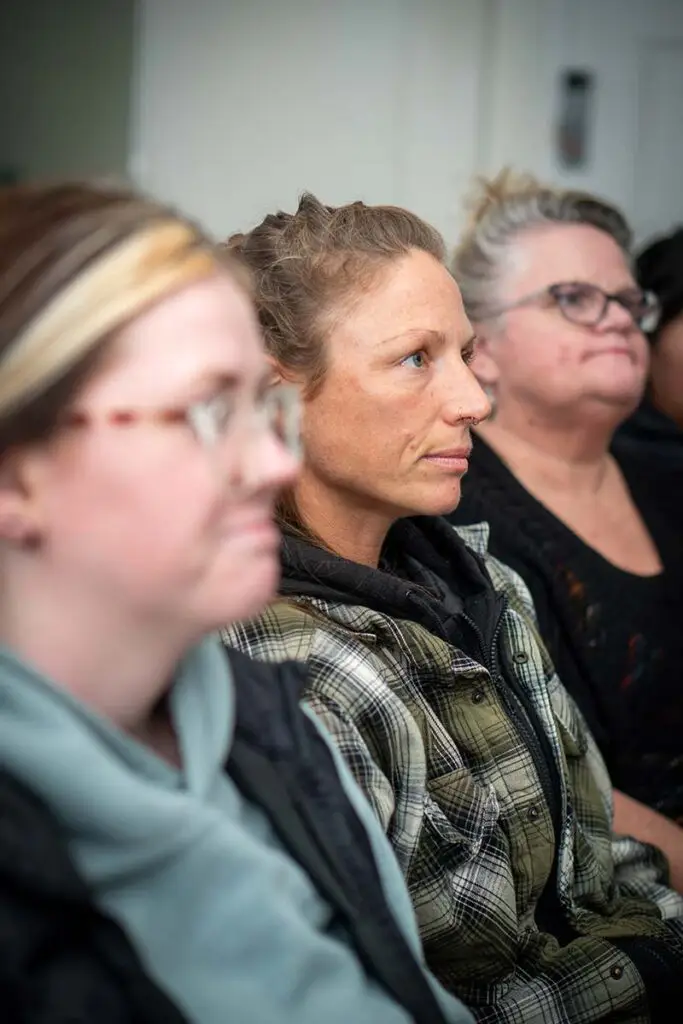What is a 12-Step Program?
A 12-step program is designed to improve a person’s spiritual base and assist them in recovering from an addiction to alcohol and drugs. 12-step programs can also assist the family of the individual suffering. New Directions for Women is based in the 12 Steps and we have seen thousands of women begin the journey of recovery by working these steps. “When the spiritual malady is overcome, we straighten out mentally and physically.” p. 64 of the Big Book of Alcoholics Anonymous.

What Does a 12-Step Program Help With?
12-step programs not only help clients in treatment recover from their addictions but is a vital tool for creating a healthy and sober lifestyle after treatment. 12-step programs are one of the most widely used treatment methods to deal with alcoholism, drug abuse, and other addictive and dysfunctional behavior patterns.
Top 10 Addictions Treated Through the 12-Step Program:
- Alcohol Addiction
- Drug Addiction (e.g., opioids, cocaine, methamphetamine)
- Gambling Addiction
- Nicotine Addiction
- Food Addiction (e.g., overeating, binge eating)
- Prescription Medication Addiction
- Sex and Love Addiction
- Internet and Technology Addiction
- Shopping and Spending Addiction
- Workaholism (Compulsive Working)
Programs may also be tailored to support women in specific situations. For example, a 12-step rehab for pregnant women will consider participants’ unique biological and emotional circumstances.
The 12-Step Program: A Basic Overview
Many people wonder what is the difference between a 12-step program and other recovery approaches. The 12-Step Program is based on a set of guiding principles originally developed by Alcoholics Anonymous (AA) to help individuals achieve sobriety from alcoholism.
The basic concepts of the program include acknowledging powerlessness over addictions, surrendering to a higher power, conducting a moral inventory, making amends for past wrongs, and engaging in continuous self-improvement. Participants work on overcoming fear through the 12-step program.
Each step emphasizes spiritual growth, personal responsibility, and the importance of supporting others in their recovery journey. Throughout the 12-step program, participants build upon their progress by addressing the physical, mental, and spiritual aspects of addiction and recovery.
What are the 12 steps?
 The 12 steps of AA are as follows:
The 12 steps of AA are as follows:
- We admitted we were powerless over alcohol — that our lives had become unmanageable.
- Came to believe that a Power greater than ourselves could restore us to sanity.
- Made a decision to turn our will and our lives over to the care of God as we understood Him.
- Made a searching and fearless moral inventory of ourselves.
- Admitted to God, to ourselves, and to another human being the exact nature of our wrongs.
- Were entirely ready to have God remove all these defects of character.
- Humbly asked Him to remove our shortcomings.
- Made a list of all persons we had harmed, and became willing to make amends to them all.
- Made direct amends to such people wherever possible, except when to do so would injure them or others.
- Continued to take personal inventory and when we were wrong promptly admitted it.
- Sought through prayer and meditation to improve our conscious contact with God as we understood Him, praying only for knowledge of His will for us and the power to carry that out.
- Having had a spiritual awakening as the result of these Steps, we tried to carry this message to alcoholics, and to practice these principles in all our affairs.
If you’re unfamiliar with the steps, here is a breakdown of the underlying principle of each of these steps, and how each one helps in achieving sobriety:
- Honesty: This step focuses on removing the denial from the individual’s minds.
- Faith: This step involves a spiritual truth that before a higher power can work in your life, you must believe in one.
- Surrender: The goal of this step is to turn your life over to a higher power.
- Soul Searching: Here, an individual must search inside themselves for answers to questions of addiction.
- Integrity: This step gives the individual the greatest chance for growth, but can also be one of the most challenging.
- Acceptance: The goal for this step is for the individual to accept character defects exactly as they are and become willing to let negativity go.
- Humility: This step requires the individual to understand that there are some things that they can only get from a higher power.
- Willingness: During this step, individuals will make a list of the people that they have wronged, but more importantly, they need to become willing to repair the damage.
- Forgiveness: This step can greatly heal many wounds for the individual suffering from alcohol and drug addiction. Although it is difficult to make amends with all the people on their list, it can incredibly rewarding and “freeing.”
- Maintenance: The goal of this step is to continue the spiritual recovery and healing progress by having the individual admit when they are wrong and the wrongs that they have done.
- Making Contact: The purpose of this step is to understand the plan that a higher power has for your life.
- Service: This step will help the individual understand how it all works and help others.
Millions of people throughout the world have recovered from addiction using the 12 Steps, and they have been translated into dozens of languages. Many people continue to celebrate sustain recovery through practicing the 12 steps and attending meetings. Thankfully, many of these people can be available to the individual suffering from alcohol and/or drug addiction.
New Directions for Women’s 12-Step Rehab Program
New Directions for Women hosts 12-step meetings for women in Costa Mesa as part of our proven approach to lasting addiction recovery.
By integrating these principles, the program provides a structured and supportive framework that emphasizes self-reflection, accountability, and spiritual growth—elements that contribute to a holistic and enduring recovery process for individuals seeking help with substance abuse or behavioral addictions.
We also provide special support for pregnant women interested in a 12-step rehab program. If you want more information about what are the 12 steps for mothers, women with co-occurring conditions, or other unique circumstances, please contact us.
12-Step Rehab Program at New Directions for Women
 At New Directions for Women we have seen many women renewed and restored by following the powerful 12 Step program. We take pride in being one of many treatment centers who have implemented the 12 step principles, which are rooted in everything that we do. The transformation it has helped give birth to is unbelievable yet attainable. New Directions for Women offers the same option to women, women with children, and pregnant women who desire a similar result. If you know someone who needs treatment, contact us on Twitter, Facebook, LinkedIn, or simply by phone at 888-312-5499 we can help.
At New Directions for Women we have seen many women renewed and restored by following the powerful 12 Step program. We take pride in being one of many treatment centers who have implemented the 12 step principles, which are rooted in everything that we do. The transformation it has helped give birth to is unbelievable yet attainable. New Directions for Women offers the same option to women, women with children, and pregnant women who desire a similar result. If you know someone who needs treatment, contact us on Twitter, Facebook, LinkedIn, or simply by phone at 888-312-5499 we can help.












